LIGHTNING IN A VOLCANO!!!
i was also a bit baffled when I heard of it the first time, i was wondering the possible explanation to such natural phenomenon, but later it seemed very possible out of some of my hypothetical approach to it. But as i made some research i realized most scientists don't really understand how it works, their many hypothesis seemed inconclusive, so there was not definite explanation to such phenomenon.But in this post ill be giving necessary information to the production of lightning in a volcanic eruption and also giving the most reasonable hypothesis towards its happening.
What is a volcanic lightning?
(From Wikipedia), [https://en.m.wikipedia.org/wiki/Dirty_thunderstormA]
Dirty thunderstorm (also volcanic lightning, thunder volcano) is a weather phenomenon that is related to the production of lightning in a volcanic plume.
Volcanic lightning is not formed deep in the Earth. As the phenomenon is attain at the surface of the eruption. Dirty thunderstorms are a rare phenomenon, associated with a massive volcanic eruptions.
Brief history of the volcanic lightning
(From Oregon state University) [http://volcano.oregonstate.edu/history-volcanic-lightning]
over the past 2000 years ago humans have witnessed lightning bolts flashing in and around erupted ash plumes.
The earliest known written account of volcanic lightning was from Pliny the Elder, a residence of Pompeii, he wrote; "there was a most intense darkness rendered more appalling by the fitful gleam of torches at intervals obscured by the transient blaze of lightning."
Vesuvius would also be the sight of the first volcanic lightning studies conducted by Mr. Palmieri who manned the Vesuvius observatory during the eruptions of 1858,1861, 1868, and 1872. Mt Vesuvius eruptions have been relatively frequent and have always included an array of lightning activity within their plumes and ash clouds.The most well documented volcanic lightning shows ocurred in the eruptions of 1707, 1872, 1906, and 1944. The 1944 eruption is among the earliest to have its volcanic lightning captured in photographs.
A famous image of the phenomenon was photographed by Carlos Gutierrez and occurred in Chile above the Chaiten Volcano.
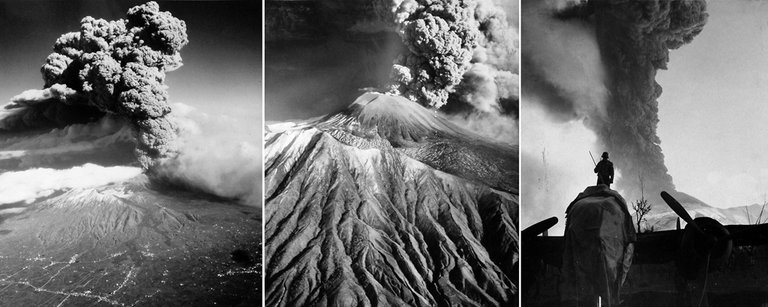
[https://news.nationalgeographic.com/news/2008/05/photogalleries/volcano-photos/]
It circulated widely on the internet.
Another notable image of this phenomenon is "The Power of Nature"
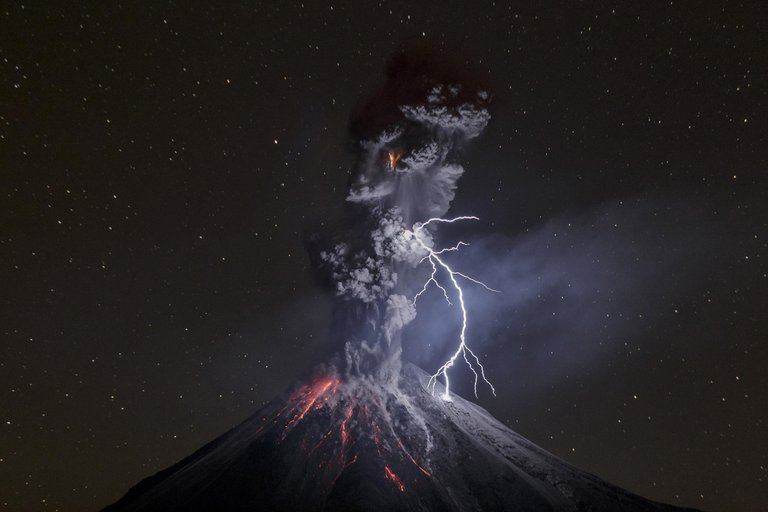
[https://www.worldpressphoto.org/collection/photo/2016/nature/sergio-tapiro]
taken by Mexican photographer Sergio Tapiro in Colima, Mexico, which won third place (Nature category) in the 2016 World Press Photo Contest.
Volcanic lightning is a visually incredible, naturally occurring phenomenon that has been witnessed and documented in nearly 200 eruptions over the last 200 years. The most recent images of volcanic lightning that occurred at Eyjafjallajokull have generated a lot of interest worldwide and allowed people to witness volcanic lightning for the first time in real time and high definition.
Volcanic lightning at Eyjafjallajokull Iceland.

What causes volcanic lightning?
To understand what causes the volcanic lightning phenomenon. We must first get an intuitive of what causes lighting in the atmosphere.
Hence, atmospheric lightning,
Lightning is not just a magnificent phenomenon of nature, despite its beauty its also a very dangerous process. Scientists have been trying to crack the process of lightning, which was as been attained.
Lightning, is a flash of light created by electrostatic discharge between the charged region of the cloud or between the earth and the electrically charged region of the cloud. Lightning forms inside a cloud when a mix of warm and cold air causes a static electrical charge to build, with the top of the cloud having a positive charge and the bottom having a negative one.
The length and duration may vary but and average account to 30 micro seconds. But according to my hypothesis of that aspect, i belive that the duration is dependent on the distance between the earth surface (having the positive charge) and the charged cloud (negative) hence the longest the lighting, the thinner it will be and the more duration it will be per each lightning strikes, hence using the theory of longer wavelength equals smaller frequency and vice versa hence producing lesser energy because short wavelength are more energetic than longer ones.
http://volcano.oregonstate.edu/history-volcanic-lightning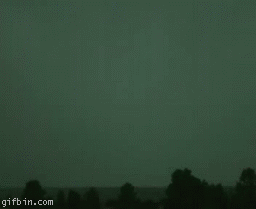
What causes volcanic lightning?

How can a volcano create lightning? Why is volcanic lightning often contained within or in close proximity to the ash plume? What types of eruptions are most conducive for the creation of volcanic lightning? These are all good questions, and in order to answer them we must first look at the physics that makes it all possible.In order for lightning to form there is one key component; a large charge separation between two masses. If the charge separation becomes big enough it is then able to overpower the air resistance, create a path of ionized air, and conduct electricity in the form of lightning.
The ash that is to be erupted begins as electrostatically neutral rock or rock fragments. Heat and movement within the volcano is thought to be the first source of particle charging, although the main process by which ash particles acquire a charge is friction. When an object (in this case ash) with a neutral charge comes in contact with another object with differing electrostatic qualities, electrons can potentially flow and one of the objects can become charged relative to the other. Think of skidding your socked feet rapidly across the carpet or rubbing a balloon quickly against your head. The same type of charge is accumulating within the ash cloud, only on a much larger scale.
the churning magma inside the rim of the volcano causes the ash cloud right above it to become electrified. Eventually, this charge builds up similar to the way it does in a normal cloud, producing a lightning strike."These data lead us to infer that although volcanic and thundercloud lightning share many common physical characteristics, the conditions presaging the occurrence of electrical discharges at explosive eruptions result from the complex charge distribution within the developing plume, and more the magnitude of the ash plume the more frequent lightning[From Wikipedia]
A study in the journal Science indicated that electrical charges are generated when rock fragments, ash, and ice particles in a volcanic plume collide and produce static charges, just as ice particles collide in regular thunderstorms.
Volcanic eruptions are sometimes accompanied by flashes of lightning. However, this lightning doesn’t descend from storm clouds in the sky. It is generated within the ash cloud spewing from the volcano, in a process called charge separation.
here are more pronounced images gotten from nbcnews.com
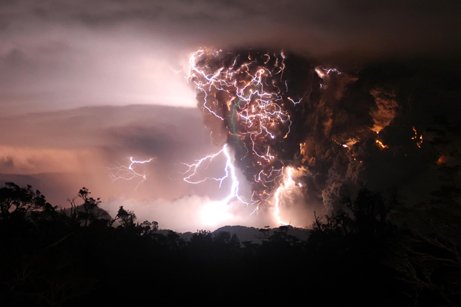
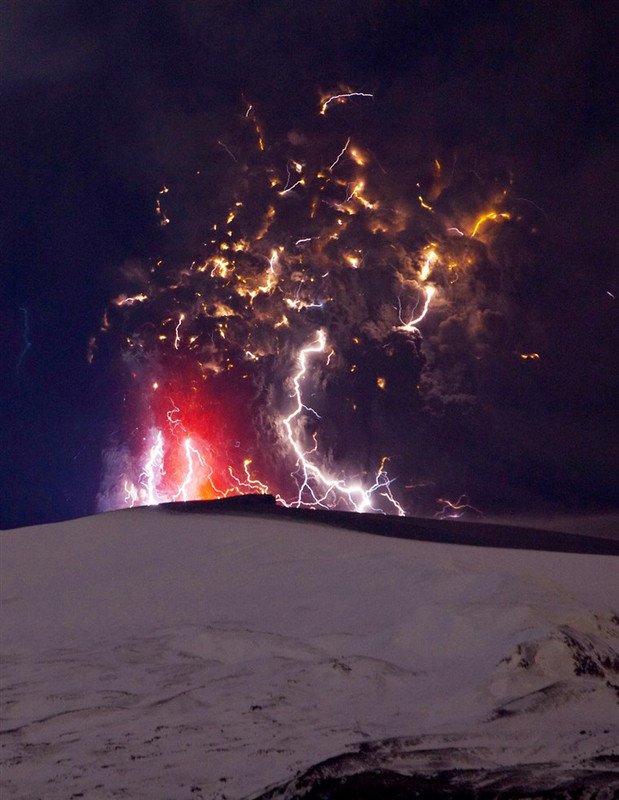

And that's all for the volcanic lightning phenomenon
References of which this post was researched from;
wikipedia.org/
forbes.com
bbc.com
nbcnews.com
Pls if you like this post kindly resteem and up vote thank you
Don't miss the next episode of my blog as it's gonna be juicier than every last. Catch me at @dalphiesteem]
Congratulations @dalphiesteem! You received a personal award!
Click here to view your Board
Vote for @Steemitboard as a witness and get one more award and increased upvotes!
Congratulations @dalphiesteem! You received a personal award!
You can view your badges on your Steem Board and compare to others on the Steem Ranking
Do not miss the last post from @steemitboard:
Vote for @Steemitboard as a witness to get one more award and increased upvotes!